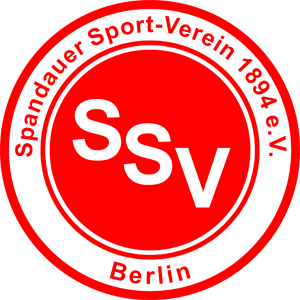
Sp.Vg. Blau-Weiß 1890 Berlin, generally referred to as Blau-Weiß 90, was a German association football club based in the Mariendorf district of Berlin. The club was formed on 27 July 1927 out of the merger of Berliner FC Vorwärts 1890, German championship runner-up of 1921, and Berliner Thor- und Fussball Club Union 1892, German champions of 1905. Blau-Weiß 90 spent one season in the German first division, the Bundesliga.

VfB Lübeck is a German association football club playing in Lübeck, Schleswig-Holstein in the country's north. In addition to its football side the 1,000 member sports club also has departments for badminton, women's gymnastics, handball, and table tennis.

Spandauer SV was a German football club from Berlin.

Berliner Fußball-Club Viktoria 1889 was a German sports club based in the Tempelhof district of Berlin. Football, rugby, and cricket came to continental Europe in the late 19th century, and these "English games" became immediately popular in many countries. Viktoria was the oldest club in Germany that had teams playing both football and cricket. It was one of the founding members of the German Football Association (DFB) in Leipzig in 1900. The club merged with Lichterfelder FC in 2013 and has continued as FC Viktoria 1889 Berlin.

Berliner SV 1892 is a German association football club from the district of Wilmersdorf, Berlin. BSV is one of the country's oldest clubs and was a founding member of the DFB in 1900. The club also operates a rugby union department, Berliner SV 92 Rugby, which, in 1948, reached the German rugby union championship final.
SC Wacker Leipzig was a German association football club playing in Leipzig, Saxony. The club was formed 24 February 1895 out of the merger of the school clubs Concordia Leipzig and Saxonia Leipzig. Wacker was a founding member of the German Football Association in 1900.

VfB Einheit zu Pankow is a German association football club from the Pankow locality of Berlin.
VfL Halle 1896 is a German football club from the city of Halle (Saale) in Saxony-Anhalt.
Luftwaffen-SV Hamburg was a short-lived military German association football club active during World War II and is notable as the most successful of the wartime military sides.

LSV Pütnitz was a short-lived German association football club from the district of Pütnitz in Ribnitz-Damgarten, Mecklenburg-Vorpommern.
KS Gedania Danzig was an ethnically-Polish association football club that was part of German football competition in the inter-war period. It was formed in 1922 in what was at the time the Free City of Danzig. Banned by the Nazis in 1939, the club re-emerged following the end of World War II and is active today as Gedania 1922 Gdańsk.
Lufttwaffensportverein Ahlhorn was a short-lived German football club from the town of Ahlhorn near Oldenburg, Lower Saxony. LSV was an air force sports club that was active for just a single season (1943–44) in the first division Gauliga Oldenburg-Friesland where they earned a 3rd-place finish. During World War II it was common in Germany for military sides to take part in domestic competition. The most successful of these clubs was LSV Hamburg which appeared in the final of the Tschammerpokal, predecessor of today's German Cup, in 1943 and in the national championship final in 1944.

Friedrichshaner SV Berolina Stralau 01 is a German association football club from the city of Berlin. It is the successor to Berolina Berlin which was formed 1 July 1901 as Berliner Fußball-Club Libertas-Südost Berlin.

Weißenseer FC is a German football club from district of Weißensee in the city of Berlin. The club's roots go back its founding on 8 September 1900, while more recently it has been linked with Sportverein Prussia Berlin and Pankower Fußball Verein Bergmann-Borsig.

FC Treptow is a German association football club from the city of Berlin and is the successor to Werkverein der BEWAG Berlin which was established in 1928 as the worker's sports club of the city's electric utility Bewag Aktiengesellschaft.

Minerva 93 Berlin is a German association football club from the district of Moabit in the city of Berlin. The club was established 10 May 1893 as Berliner Fußball Club Minerva taking its name from the Roman goddess of wisdom. A merger with Wilmersdorfer FC Frühling in 1896 led to the club taking on the name Sport-Club Minerva 93 Berlin.
Polizei SV Berlin was a German football club from the city of Berlin. The early 1920s saw the formation of sports clubs for police and postal workers which included the establishment on 1 June 1921 of Sport-Verein Schutzpolizei Berlin as the club of the city's police force. It was renamed Polizei SV Berlin in 1922 and advanced to play first-division football in the Oberliga Berlin for a single season in 1926–27. They returned to Oberliga play in 1929 for a three-year turn that ended after a 9th-place finish in 1932. In 1930, the club took part in the Berliner Landespokal and went out 1–2 to Minerva Berlin in a quarterfinal match.
Luftwaffensportverein Danzig was a short-lived German association football club from the city of Danzig, West Prussia. LSV was an air force (Luftwaffe) sports club that was active from 1941–44 and was made up primarily of flak soldiers. During World War II it was common in Germany for military sides to take part in domestic competition. The most successful of these clubs was LSV Hamburg which appeared in the final of the Tschammerpokal, predecessor of today's German Cup, in 1943 and in the national championship final in 1944.

The 1941–42 Gauliga was the ninth season of the Gauliga, the first tier of the football league system in Germany from 1933 to 1945. It was the third season of the league held during the Second World War.












